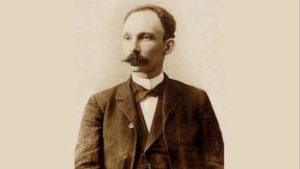
José Martí
*José Martí was born on this date in 1853. He was an Afro Cuban nationalist, poet, philosopher, essayist, journalist, translator, professor, and publisher.
Born in Havana, Spanish Empire, José Julián Martí Pérez began his political activism at an early age. In 1865, he enrolled in the Escuela de Instruction Primaria Superior Municipal de Varones, headed by Rafael María de Mendive. Mendive was influential in the development of Martí's political philosophies. Also instrumental in his development of social and political conscience was his best friend, Fermín Valdés Domínguez, the son of a wealthy slave-owning family.
In April of the same year, after hearing the news of the assassination of Abraham Lincoln, Martí and other young students expressed their pain—through group mourning—for the death of a man who had decreed the abolition of slavery in the United States. In 1866, he attended the Instituto de Segunda Enseñanza, where Mendive financed his studies, and the Escuela Professional de Pintura y Escultura de La Habana in 1867 to take drawing classes. In April 1868, his poem was dedicated to Mendive's wife, A Micaela. En la Muerte de Miguel Ángel appeared in the newspaper El Álbum.
When the Ten Years' War broke out in Cuba in 1868, he and his friend Fermín joined the Cuban nationalist cause. Martí had a precocious desire for the independence and freedom of Cuba. He started writing poems about this vision to do something to achieve this dream. In 1869, he published his first political writings in the only edition of El Diablo Cojuelo. That same year he published "Abdala," a patriotic drama in the one-volume La Patria Libre newspaper, which he published himself. His sonnet "10 de Octubre", later becoming one of his most famous poems, was also written that year and later published in his school newspaper. In March of that year, colonial authorities shut down the school. He came to resent Spanish rule and developed a hatred of slavery practiced in Cuba. On October 21, 1869, he was arrested and confined in the national jail for treason and bribery.
The Spanish government discovered a "reproving" letter, which Martí and Fermín had written to a friend when the friend joined the Spanish army. Martí confessed to the charges and got six years in prison. His mother tried to free her son by writing letters to the government, and his father went to a lawyer friend for legal support, but both efforts failed. Eventually, Martí fell ill; he was transferred to another part of Cuba called Isla de Pinos. Following that, the Spanish exiled him to Spain.
In Spain, Martí, who was 18, was allowed to continue his studies with the hopes that studying there would renew his loyalty to Spain. Martí opposed slavery and criticized Spain for upholding it. In a speech to Cuban immigrants in Steck Hall, New York, on January 24, 1879, he stated that the war against Spain needed to be fought, recalled the heroism and suffering of the Ten Years' War, which, he declared, had qualified Cuba with a right to independence. Spain had not ratified the peace treaty conditions, falsified elections, continued excessive taxation, and failed to abolish slavery.
Cuba needed to be free. He was a key figure in the planning and execution of this war and the designer of the Cuban Revolutionary Party and its ideology. He died in military action during the Battle of Dos Ríos on May 19, 1895. After his death, verses from the book Versos Sencillos were adapted to the song "Guantanamera," which has become a prominent representative of Cuba. The concepts of freedom, liberty, and democracy are prominent themes in all his works, influencing Nicaraguan poet Rubén Darío and the Chilean poet Gabriela Mistral. He was also an important figure in Latin American literature. He was very politically active and is considered an important philosopher and political theorist.
His unification of the Cuban émigré community, particularly in Florida, was crucial to the success of the Cuban War of Independence against Spain. Through his writings and political activity, he became a symbol of Cuba's bid for independence from the Spanish Empire in the 19th century and is referred to as the "Apostle of Cuban Independence." Martí is considered one of the great turn-of-the-century Latin American intellectuals. His written works include a series of poems, essays, letters, lectures, a novel, and a children's magazine.
He wrote for numerous Latin American and American newspapers and founded several newspapers. His newspaper Patria was an important instrument in his campaign for Cuban independence. Following the 1959 Cuban Revolution, Martí's ideology became a major driving force in Cuban politics. He is regarded as Cuba's martyr and a Cuban national hero because of his role in the liberation of his country from Spain.